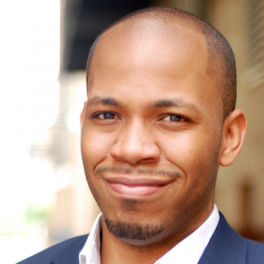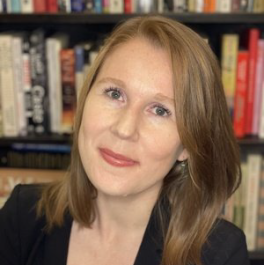The Department of Sociology added two new assistant faculty members in 2020: Dr. Anthony Johnson, and Dr. Lauren Valentino.
New Faculty Profiles

Welcome! Where are you joining us from?
I recently completed a postdoctoral fellowship with the Inequality in America Initiative at Harvard University. Prior to that, I attended Northwestern University where I completed my PhD in the Department of Sociology.
Please tell us about the main questions your research seeks to answer.
My research asks whether and how inequality in college students’ collaborative experiences persist in the wake of the widespread adoption of collaborative learning in science, technology, engineering, and mathematics (STEM) programs. A wealth of research shows that collaborative learning, when properly structured, is associated with gains in cognitive learning, grade performance, and persistence in STEM majors. Moreover, collaborative learning is considered an important strategy for advancing educational opportunity and equity such that less privileged, underrepresented students in STEM—largely on the basis of secondary school resource context but also social class, gender, and race/ethnicity—are likely to benefit the most from collaborative learning. Despite these advantages, there is limited sociological research on students’ experiences with collaboration in college as well as their unintended consequences for inequality.
What kinds of methods do you use to study these questions?
My research draws on an ethnographic case study of an elite engineering school at a private university. I conducted participant observation over the course of two years, observing general activities within the engineering school, including campus visit days, orientations, activities fairs, and graduations; design courses where students worked in small groups on semester-long projects; and two engineering student organizations that serve the school’s underrepresented students of color: the National Society of Black Engineers and the Society of Hispanic Professional Engineers. Lastly, I conducted in-depth interviews with a sociodemographically diverse group of nearly 90 engineering undergraduates and a handful of administrators.
What are the main findings from your research to date?
In my research, I argue that the culture and structure of the engineering school and many other elite STEM programs actually undermine the equitable promises of collaborative learning by facilitating the creation of disparities in students’ collaborative experiences and the learning opportunities that emerge from them. In academically rigorous and supposedly meritocratic environments defined by competition for grades and status and socially segregated peer networks, STEM departments’ use and logic of the grading curve, collaboration, and merit systematically produce inequalities in opportunities for collaboration and even engagement within collaborative groups based on students’ access to class-based cultural, social, economic, and academic resources, as well as gender and race/ethnicity.
What classes will you be teaching at Ohio State this year?
I will be teaching two undergraduate courses in the spring 2021: Social Stratification and Sociology of Education.
What are you most excited about with respect to this upcoming year?
I am most excited about future engagement opportunities with a vibrant sociology department that shares research specializations in social stratification, especially within the context of education and work and occupations. I am also looking forward to working with graduate and undergraduate students as they pursue their respective research programs and career trajectories.
What do you do when you're not researching and teaching?
When I’m not teaching, I enjoy brushing up on my French speaking skills, watching my favorite Netflix shows, bowling, and going on road trips to nearby getaway cities.

Welcome! Where are you joining us from?
I’m coming from Duke University in Durham, North Carolina, where I’ve just completed a postdoc at the Kenan Institute for Ethics. I’m a native North Carolinian (originally from Charlotte), although I’ve lived in many other places as part of my educational trajectory, including New England and France.
Please tell us about the main research questions your research seeks to answer.
I’m interested in how people understand and make sense of social inequality in the United States — by social inequality, I mean disparities in terms of race, class, and gender. We know that many of these disparities are either getting worse, or were equalizing, but have now stalled. I want to know how Americans perceive these disparities and how these mental models shape their policy preferences or the kinds of social movements they support. My work uses insights from culture and cognition to help answer these questions.
What kinds of methods do you use to study these questions?
The methods I primarily use include survey-experiments, interviews, and quantitative analysis of secondary data. I also really like to use mixed-methods in my work; I find this is a nice way to conduct research that is both inductive and deductive and is also useful for triangulating findings.
What are the main findings from your research to date?
Thus far, my work has focused on three areas of research: perceptions of the occupational status hierarchy; beliefs about poverty; and the gender gap in science, technology, engineering, and math. My dissertation work demonstrates that existing inequalities in the labor force, namely gender and racial segregation of occupations, influence the extent to which we see those jobs as prestigious. I also find that a person’s own social position — things like their social class, gender, race, age, and even where they live geographically — shape which jobs they see as high status. In my work on beliefs about poverty, I find Americans make important distinctions about who is poor and why they are poor, and that conservatives and liberals have fundamentally different cognitive associations with poverty, which can help us understand some of the entrenched political polarization in support for welfare and the ACA. Finally, in my work on the gender gap in STEM, I’ve shown the importance of role models — in the form of female high school math and science teachers — for women’s likelihood of majoring in and completing a STEM degree.
What classes will you be teaching at Ohio State this year?
This year I will teach Introduction to Sociology — regular and honors.
What are you most excited about with respect to this upcoming year?
I’m incredibly excited to join such a fantastically rich, diverse and supportive community of scholars. I’m really looking forward to being a part of the various workshops and colloquia in the department, as well as more informal collaborations with other faculty members and graduate students.
What do you do when you're not researching and teaching?
Outside of sociology, I love yoga and trail biking. When there’s not a global pandemic, I try to travel as much as I can, especially internationally since I have a lot of family in India. I also really enjoy cooking up delicious vegan food and spending lots of time with my cat Bisou.
